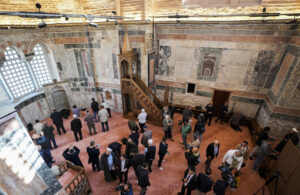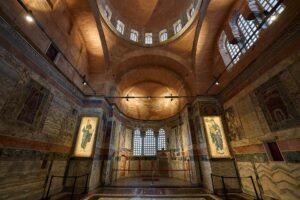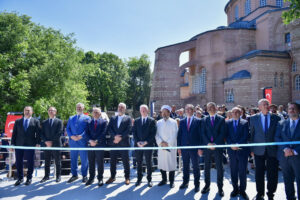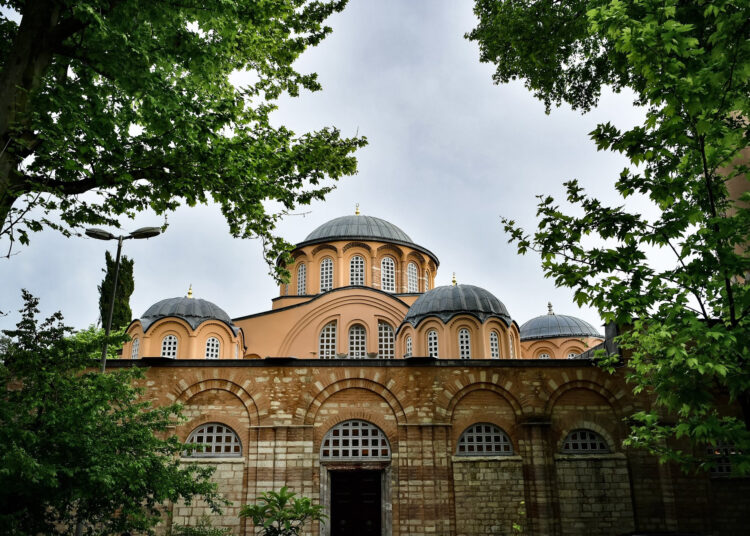Abdullah Bozkurt/Stockholm
The Islamist regime of Turkish President Recep Tayyip Erdogan continues to convert historic museums into mosques as part of his government’s campaign to appease the Islamist and nationalist base upon which he draws his most loyal support during elections.
The latest example in this series of conversions is the Kariye Museum, also known as the Chora Church. A legal challenge aimed at halting the government’s move has failed — unsurprising given that Turkey’s judiciary is almost entirely dominated by Erdogan’s ruling Justice and Development Party (AKP) and its far-right ally, the Nationalist Movement Party (MHP).
On November 25, 2024, Turkey’s Council of State (Danıştay), the country’s top administrative court, rejected a lawsuit seeking to overturn the government’s 2020 decision to reconvert Istanbul’s historic Kariye Museum into a mosque, thereby clearing the way for the site’s continued management by the government’s religious authority, the Directorate of Religious Affairs (Diyanet).
The ruling, delivered unanimously by the 10th Chamber of the Council of State on November 25, 2024, dismissed both procedural and substantive claims brought by a group of plaintiffs that included Turkish citizens as well as several foreign academics specializing in Byzantine history and Christian heritage.
Originally built as the Byzantine-era Chora Monastery in the 11th century, the building was converted into a mosque after the Ottoman conquest of Constantinople and functioned as such until the mid-20th century. In 1945 a Cabinet decree transferred the site to the Ministry of Education for use as a museum, which formally opened in 1958 after extensive restorations financed by the Dumbarton Oaks Center for Byzantine Studies in Washington, D.C.
Turkey’s top administrative court, the Council of State (Danıştay), rejected a lawsuit filed by a group of plaintiffs seeking to preserve the Kariye Museum’s status and prevent its conversion into a mosque:
However, in 2019 the Council of State — apparently acting under political directives from Erdogan’s government — annulled the 1945 Cabinet decision, ruling that the site, classified as a vakıf hayrat (endowment property), could not legally be designated for purposes other than those originally intended by its foundation.
Following that judgment, Erdogan issued a decree in August 2020 transferring the building to the Diyanet and reopening it for Muslim worship.
The lawsuit was filed by a diverse group of eight individuals. Among them was Ioli Kalavrezou, a US citizen and Harvard University professor of Byzantine art and culture affiliated with the Dumbarton Oaks Center for Byzantine Studies. She argued that the decision restricted her academic and cultural rights, given her long-standing research on the Kariye’s mosaics and frescoes.
Also among the plaintiffs was a British citizen and member of the Orthodox Christian community who claimed that the reconversion undermined his right to freely access and study Orthodox religious heritage in Istanbul, the historical center of Eastern Orthodoxy.
A Greek citizen, born in Istanbul and educated in the city’s minority schools until the age of 14, also joined the case. He described himself as a former member of the local Greek Orthodox community and argued that his personal and cultural ties to Istanbul’s religious monuments entitled him to challenge the decree.

An Italian citizen, a Catholic theologian and professor of Christian history at the University of Modena-Reggio Emilia, also participated as a plaintiff. He serves as director of the Giovanni XXIII Theological Institute in Bologna and holds the UNESCO Chair on Religious Pluralism and Peace. He argued that restricting the site’s museum status reduced its universal accessibility as a Christian and Byzantine heritage monument.
In addition, four Turkish citizens joined the case, including individuals of the Greek Orthodox faith. They contended that the Kariye Museum represented shared cultural heritage for Turkish society as a whole and that its conversion into a mosque undermined its role as a center for intercultural dialogue, tourism and education.
The plaintiffs argued that the reconversion violated both Turkish and international law. They claimed that the Kariye was “a shared heritage of humanity,” protected under UNESCO’s World Heritage Convention, the European Cultural Convention, the European Convention on Human Rights, the International Covenant on Civil and Political Rights (ICCPR) and other treaties on cultural and archaeological preservation.
Foreign plaintiffs asserted that the decision infringed on their professional and cultural rights to access the site’s mosaics and frescoes, regarded as masterpieces of Byzantine art. Turkish plaintiffs, including members of the local Greek Orthodox community, maintained that converting the site into a mosque undermined its role as a museum promoting intercultural understanding and generating tourism revenue.

The Turkish government countered that the presidential decree was not a discretionary political act but a legal requirement to comply with the Council of State’s 2019 annulment of the 1945 Cabinet decision. Officials argued that as a vakıf property dedicated to religious use, the Kariye’s reconversion into a mosque was mandated under both constitutional and administrative law.
The government further argued that the foreign nationals lacked legal standing as the decision did not directly affect their personal rights. The court agreed with the government’s position, concluding that there was no “personal, legitimate or current legal interest” tying them directly to the presidential decree.
The claims of the Turkish plaintiffs were also rejected. The court ruled that the 2020 decree complied with its earlier binding judgment and did not alter the protected cultural heritage status of the building. The mosaics and frescoes, it noted, remained safeguarded under Turkey’s cultural preservation laws.

“The presidential decision was issued within the framework of binding judicial rulings and does not constitute a violation of cultural heritage protections,” the ruling stated.
The decision mirrors the high-profile case of the Hagia Sophia, which was similarly reconverted from a museum to a mosque in 2020 following a Council of State ruling, with Erdogan personally leading the campaign. Both moves have drawn sharp criticism from international cultural organizations, Christian communities and numerous governments, who argue that such actions politicize heritage sites and threaten their universal value.
Supporters of the conversions, however, frame them as corrections of historical injustices and affirmations of Turkey’s sovereignty over its cultural assets. They present the reconversions as reassertions of the country’s Muslim identity, moves that have delivered Erdogan substantial political credit among conservative constituencies.
The Council of State’s ruling cements the Kariye Mosque’s legal status, underscoring the Erdogan government’s broader policy of reclaiming Ottoman-era religious heritage sites for Islamic worship — measures that not only serve ideological goals but also strengthen Erdogan’s political standing with his Islamist base.












